When I hear of someone who is vegetarian or vegan and doesn’t feel well, I think of gluten. I have nothing against people who don’t eat meat. I just think that vegetarianism has changed over the years from being about eating grains, fruits and vegetables to eating processed meat alternatives. There is a danger lurking in the meat substitutes that have become so popular, and that danger is gluten.
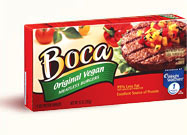 Gluten is a primary ingredient in meat replacement products because of its ability to have the texture of meat. Extracted from wheat, gluten is pure protein, the very part which many people cannot tolerate. In my 20s, I decided to cut down on my meat consumption and Boca Burgers became a common item in my freezer — I loved them and thought I was being healthy. It was also in my 20s that I became sicker and sicker. I’m not blaming Boca Burgers for my downfall– that would be stretching it! But I do think that there is far too much gluten in the average diet, and even in the diets of people who think they are being ultra-healthy by not eating meat.
Gluten is a primary ingredient in meat replacement products because of its ability to have the texture of meat. Extracted from wheat, gluten is pure protein, the very part which many people cannot tolerate. In my 20s, I decided to cut down on my meat consumption and Boca Burgers became a common item in my freezer — I loved them and thought I was being healthy. It was also in my 20s that I became sicker and sicker. I’m not blaming Boca Burgers for my downfall– that would be stretching it! But I do think that there is far too much gluten in the average diet, and even in the diets of people who think they are being ultra-healthy by not eating meat.
Just to give an example of how gluten shows up in place of meat, I will compare a hamburger to a Morningstar Farms Veggie Burger:
In a homemade hamburger, there is usually one ingredient: BEEF, and maybe some SPICES.
In a Morningstar Farms Veggie Burger, there are many ingredients involved in making it taste and feel like meat, including gluten ingredients (shown in bold below):
TEXTURED VEGETABLE PROTEIN (WHEAT GLUTEN, SOY PROTEIN CONCENTRATE, SOY PROTEIN ISOLATE, WATER FOR HYDRATION), CORN OIL, SUNFLOWER OIL, EGG WHITES, CONTAINS TWO PERCENT OR LESS OF CORNSTARCH, NATURAL FLAVORS FROM NON-MEAT SOURCES, SOY PROTEIN ISOLATE, AUTOLYZED YEAST EXTRACT, SALT, CARAMEL COLOR, ONION POWDER, SPICES, HYDROLYZED VEGETABLE PROTEIN (CORN, WHEAT, AND SOY), GARLIC POWDER, POTATO STARCH, MALTODEXTRIN, DISODIUM GUANYLATE, DISODIUM INOSINATE, SUCCINIC ACID, SUGAR,
NONFAT DRY MILK, SOYBEAN OIL, WHEAT FIBER.
Here are the ingredients of the original Boca Burger that I loved:
WATER, SOY PROTEIN CONCENTRATE, WHEAT GLUTEN, CONTAINS LESS THAN 2% OF METHYLCELLULOSE, SALT, CARAMEL COLOR, DRIED ONIONS, YEAST EXTRACT, SESAME OIL, HYDROLYZED WHEAT PROTEIN, NATURAL AND ARTIFICIAL FLAVOR (NON-MEAT), DISODIUM GUANYLATE, DISODIUM INOSINATE. CONTAINS: SOY, WHEAT, SESAME.
In addition to eating a lot of gluten in these specialty non-meat foods, many vegetarians are also consuming gluten in other foods such as pasta, cereals, crackers, breads and all the other wheat-based foods that are staples in our society.
I write this post as a caution to those who think that they should be feeling better than they do because they eat a vegetarian or vegan diet. It could be what you are eating a lot of that is making you feel worse, not better. I don’t believe that overloading on gluten and soy is a healthy way to live. There are many people living both vegetarian or vegan AND gluten-free.
What do you think? Do vegetarians and vegans eat more gluten than others?


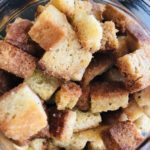
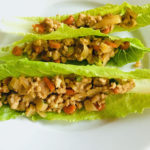
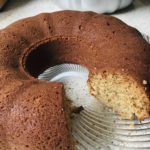
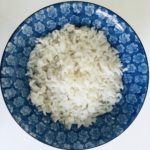

Tookl says
Hi, this happened to me and after I went off the packaged burgers etc. I feel fine. I substituted more nut-based foods and bought the Sunshine burgers instead. Now, I feel MUCH better without gluten. I had totally overdosed on the gluten and now that I don’t eat it anymore my digestive system is fine.
Colette says
Not to mention all the soy ingredients added to those burger alternatives — another source of concern for many people.
Amy says
I definitely “overdosed” on gluten (and soy) as a vegetarian. I was veg for 14 years and vegan for most of those years. Not all vegetarians eat much gluten (raw foodists come to mind) but most do. I drifted from veganism to lacto-ovo vegetarianism because the vegan burgers you mention used to give me horrific gas, and the veggie burgers that were primarily rice and veggies with eggs or cheese as a binder didn’t hurt my gut. I am grateful for my years as a vegetarian, because now I know that I am gluten sensitive (and likely celiac, but I’m not going to do a gluten challenge to confirm this!).
Vegetarians will probably want to keep the tips from “What Veg*ns Can Learn From Traditional Foods” in mind: http://nourishedkitchen.com/what-vegns-can-learn-from-traditional-foods/.
Andrea says
I would definitely say yes. I was a vegetarian and when I went gluten free I couldn’t eat half of the stuff I used to. On top of that I found out I was also allergic to soy so even more went out the window. Now I eat some meat now and again.
Cassie says
I would have to agree – there are a lot of vegetarian/vegans who do take their diets seriously and do them the healthy/right way. But, there are also a lot who don’t do the proper research they need to. After four months of trying out a vegetarian diet in college, I gave it up because I realized I ended up eating less, not more healthy, and it was starting to make me fatigued. When I was first diagnosed with Celiac a few months ago, a (vegetarian) friend of mine said to me “well gluten is bad for you anyway”, which would have been heartening except that I knew that she ate for almost every meal was pasta, pasta, or one of those lipton noodle mixes (pasta). Very far from a healthy vegetarian diet!
Rebecca says
I’m a vegetarian, and when I found out that I have Celiac disease, I was lost at first. But I’ve found that it can work, but I definitely do stick to more whole foods and less vegetarian processed foods. It’s still very difficult to go out to eat with my vegan friends though!